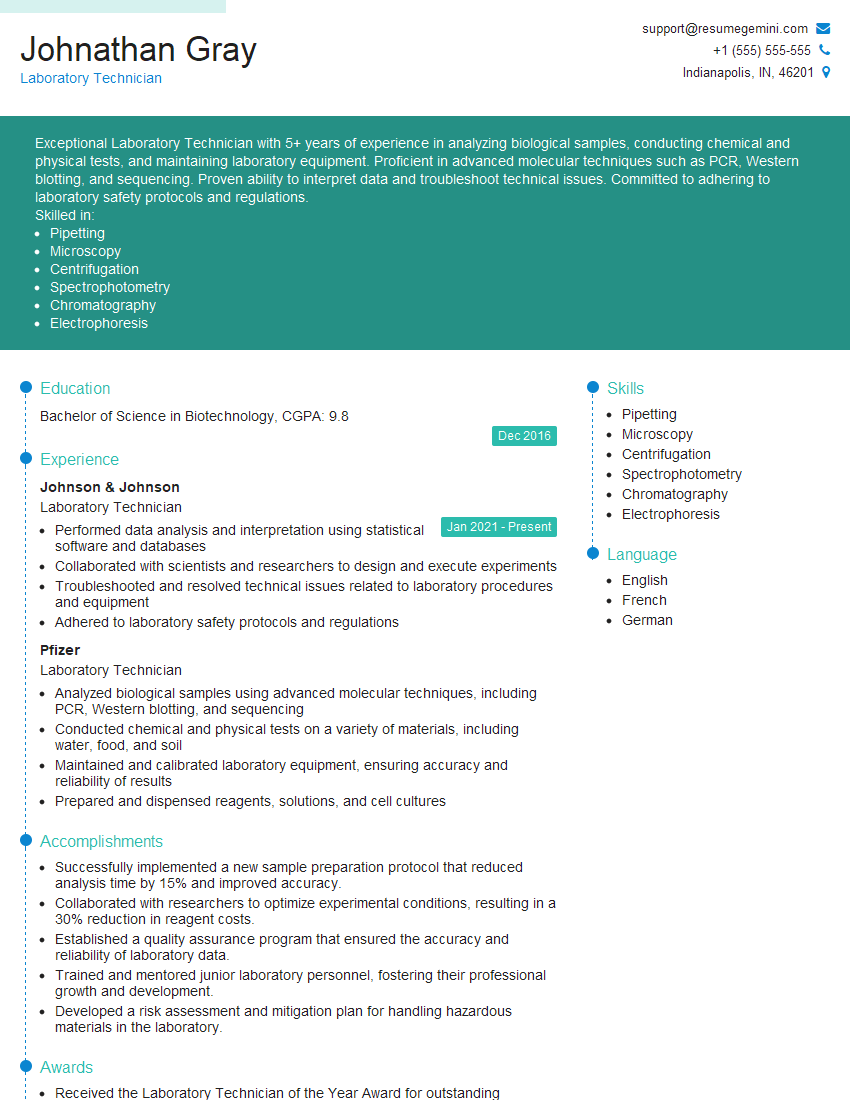Are you a seasoned Laboratory Technician seeking a new career path? Discover our professionally built Laboratory Technician Resume Template. This time-saving tool provides a solid foundation for your job search. Simply click “Edit Resume” to customize it with your unique experiences and achievements. Customize fonts and colors to match your personal style and increase your chances of landing your dream job. Explore more Resume Templates for additional options.

Johnathan Gray
Laboratory Technician
Summary
Exceptional Laboratory Technician with 5+ years of experience in analyzing biological samples, conducting chemical and physical tests, and maintaining laboratory equipment. Proficient in advanced molecular techniques such as PCR, Western blotting, and sequencing. Proven ability to interpret data and troubleshoot technical issues. Committed to adhering to laboratory safety protocols and regulations.
Skilled in:
- Pipetting
- Microscopy
- Centrifugation
- Spectrophotometry
- Chromatography
- Electrophoresis
Education
Bachelor of Science in Biotechnology
December 2016
Skills
- Pipetting
- Microscopy
- Centrifugation
- Spectrophotometry
- Chromatography
- Electrophoresis
Work Experience
Laboratory Technician
- Performed data analysis and interpretation using statistical software and databases
- Collaborated with scientists and researchers to design and execute experiments
- Troubleshooted and resolved technical issues related to laboratory procedures and equipment
- Adhered to laboratory safety protocols and regulations
Laboratory Technician
- Analyzed biological samples using advanced molecular techniques, including PCR, Western blotting, and sequencing
- Conducted chemical and physical tests on a variety of materials, including water, food, and soil
- Maintained and calibrated laboratory equipment, ensuring accuracy and reliability of results
- Prepared and dispensed reagents, solutions, and cell cultures
Accomplishments
- Successfully implemented a new sample preparation protocol that reduced analysis time by 15% and improved accuracy.
- Collaborated with researchers to optimize experimental conditions, resulting in a 30% reduction in reagent costs.
- Established a quality assurance program that ensured the accuracy and reliability of laboratory data.
- Trained and mentored junior laboratory personnel, fostering their professional growth and development.
- Developed a risk assessment and mitigation plan for handling hazardous materials in the laboratory.
Awards
- Received the Laboratory Technician of the Year Award for outstanding performance and contributions to the laboratory.
- Recognized for developing an innovative testing method that led to a 20% increase in efficiency.
- Awarded a scholarship for academic excellence in the field of Laboratory Technology.
- Received a grant to develop a novel detection method for a specific pathogen.
Certificates
- Certified Laboratory Technician (CLT)
- American Society for Clinical Laboratory Science (ASCLS)
- National Credentialing Agency for Laboratory Personnel (NCA)
- Clinical Laboratory Improvement Amendments (CLIA)
Career Expert Tips:
- Select the ideal resume template to showcase your professional experience effectively.
- Master the art of resume writing to highlight your unique qualifications and achievements.
- Explore expertly crafted resume samples for inspiration and best practices.
- Build your best resume for free this new year with ResumeGemini. Enjoy exclusive discounts on ATS optimized resume templates.
How To Write Resume For Laboratory Technician
- Highlight your technical skills and experience with specific equipment and techniques.
- Quantify your accomplishments with metrics whenever possible.
- Showcase your problem-solving abilities and attention to detail.
- Proofread your resume carefully for any errors.
- Tailor your resume to each job application, emphasizing relevant skills and experience.
Essential Experience Highlights for a Strong Laboratory Technician Resume
- Analyze biological samples using molecular techniques (PCR, Western blotting, sequencing).
- Conduct chemical and physical tests on materials (water, food, soil).
- Maintain and calibrate laboratory equipment for accuracy and reliability.
- Prepare and dispense reagents, solutions, and cell cultures.
- Perform data analysis and interpretation using statistical software and databases.
- Collaborate with scientists and researchers on experiment design and execution.
- Troubleshoot and resolve technical issues related to laboratory procedures and equipment.
Frequently Asked Questions (FAQ’s) For Laboratory Technician
What is the role of a Laboratory Technician?
Laboratory Technicians are responsible for conducting experiments, analyzing samples, collecting data, and maintaining laboratory equipment. They play a vital role in supporting scientific research and development.
What are the educational requirements for a Laboratory Technician?
Most Laboratory Technicians hold a Bachelor’s degree in a science-related field, such as biology, chemistry, or biotechnology.
What skills are important for a Laboratory Technician?
Laboratory Technicians should have strong technical skills, including proficiency in laboratory equipment and techniques. They should also have excellent communication and interpersonal skills, as they often work with scientists, researchers, and other professionals.
What is the job outlook for Laboratory Technicians?
The job outlook for Laboratory Technicians is expected to be good over the next few years. The demand for qualified Laboratory Technicians is increasing as more companies invest in research and development.
What is the average salary for a Laboratory Technician?
The average salary for a Laboratory Technician varies depending on experience and location. However, according to the U.S. Bureau of Labor Statistics, the median annual salary for Laboratory Technicians was $58,220 in May 2021.
What are the career advancement opportunities for a Laboratory Technician?
Laboratory Technicians can advance their careers by gaining experience, obtaining additional certifications, or pursuing higher education. Some Laboratory Technicians may eventually become Laboratory Supervisors or Managers.
What are the challenges faced by Laboratory Technicians?
Laboratory Technicians may face challenges due to the hazardous materials they work with, the need to work independently, and the pressure to produce accurate results in a timely manner.
What are the rewards of being a Laboratory Technician?
Laboratory Technicians can find rewards in the opportunity to contribute to scientific research, the satisfaction of solving problems, and the opportunity to work with a variety of people.